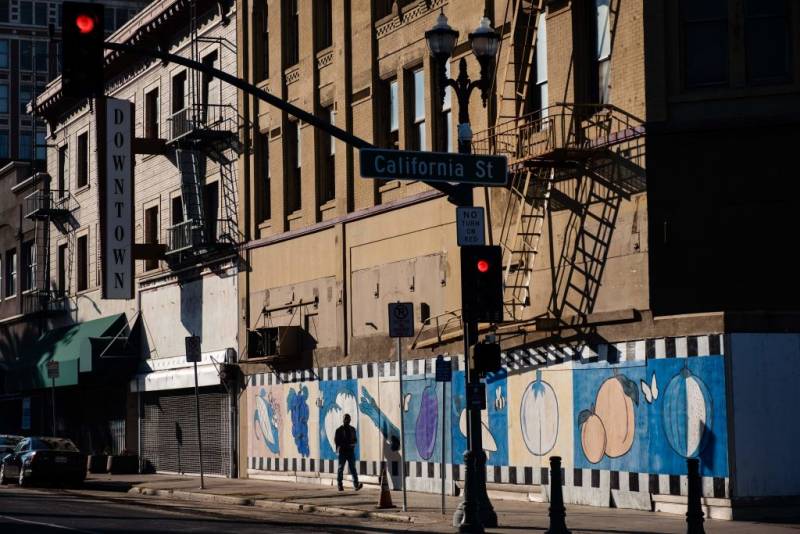A growing number of mayors in cities across the country, including Oakland, say they support giving cash to low-income families with no spending restrictions — part of a widening movement to provide a guaranteed minimum income to combat poverty and systemic racism.
Inspired by Stockton, Basic Income Programs May Be Coming to More Cities

Mayors in at least 25 cities — from Los Angeles to Paterson, New Jersey — have recently pledged to support such programs as part of the group Mayors for a Guaranteed Income (MGI). They are led by Michael Tubbs, the 30-year-old mayor of Stockton, California, who launched one of the country’s first guaranteed income programs last year, with the help of private donations from Silicon Valley.
“I’m not saying everyone should have a yacht or everyone needs to have a Benz,” Tubbs told KQED in March 2019, when the program began. “I’m saying everyone should have enough of the basics. We’re paying for it anyway in hospital visits and truancy and just how much poverty costs us.”
MGI, whose ranks have grown rapidly in recent months, points to America’s growing racial wealth gap, noting that the COVID-19 pandemic has further exposed the economic fragility of many working households and disproportionately impacted Black and brown people. The median net worth of white households is 10 times that of Black households and eight times that of Latinx households, leaving scores of working families unequipped to weather even a minor financial emergency.
The idea of guaranteed income programs has been around for decades, but it got a lot of attention in the U.S. as the centerpiece of Andrew Yang’s failed bid for the 2020 Democratic presidential nomination.
Critics scoffed at Yang’s plan to give every American $1,000 a month, which would have cost $2.8 trillion a year. Pilot programs launching in some cities across the country are covering just a few hundred people at most. The goal, Tubbs said, is to convince the federal government to launch a guaranteed income program by providing “the stories and the cover to do what is right.”
“It has to be a federal solution,” he said Wednesday. “We understand that a guaranteed income is not a panacea for everything (but) is a powerful tool that provides a floor for everyone.”
But mayors have work to do to win over critics, including Jon Coupal, president of the Howard Jarvis Taxpayers Association, a fiscally conservative advocacy group.
“Socialism is great until you run out of other people’s money,” he said, loosely quoting former British Prime Minister Margaret Thatcher. “The concept of universal minimum income is foolish. It disincentivizes work and that is socially destructive.”

Stockton’s program began in early 2019, giving $500 a month to 125 randomly selected residents. It was supposed to end in August, but Tubbs extended it through January because of the pandemic.
During the pandemic, close to half of Stockton residents used most of the money from the program on groceries, according to Tubbs.
“So we found that during the COVID time, food spending went up, from about a third of all purchases to up to 50%,” he told KQED in May. “Spending declined on things like appliances and clothing, etc. Folks are really hunkering down and making sure they have the basics to shelter in place.”
Stockton’s program is funded entirely by private donations. But some of the other programs outlined by a host of mayors at a news conference Wednesday would rely on a mix of public and private money. In St. Paul, Minnesota, Mayor Melvin Carter plans to use money from the federal CARES Act to fund the first phase of that city’s program, which will provide $500 a month to as many as 150 low-income families with young children.
Oakland Mayor Libby Schaaf, who recently pledged to support a basic income program, said doing this is “probably the most powerful policy antidote for racial disparities” that she could enact, NBC News reported in August. The program in Oakland is still in its developmental phase.
“It all comes down to resources at the end of the day,” she said, noting that she has already reached out to philanthropists for funding.
In Los Angeles, the country’s second-largest city, Mayor Eric Garcetti has pledged to launch a program that includes a mix of public and private money. He hinted the program could also help immigrants living in the country illegally “who have been written out of federal legislation.”
“At a moment of racial injustice, we see this as a way forward,” Garcetti said.
In Hudson, New York, a city of about 6,000 people, Mayor Kamal Johnson said about 25 residents are getting $500 a month for five years. That program is funded by private donations and will benefit people who are at least 18 and make $35,000 a year or less.
“We live in a city right now where people feel like they just work, pay bills and die,” Johnson said. “Being in one of the most powerful nations in the world, that shouldn’t be the way that people are living.”
In Pittsburgh, Mayor William Peduto is launching a program later this year to give $500 a month to 200 families. Half of that money would go to families headed by Black women. Researchers will compare the impact on that group versus the impact on the 100 families not headed by Black women to measure the impact of systemic racism.
KQED’s Matthew Green contributed to this story.
